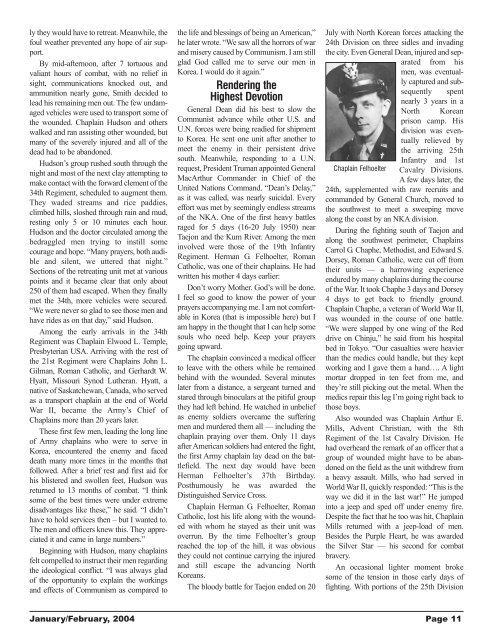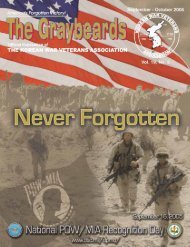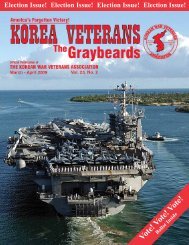The Graybeards - Korean War Veterans Association
The Graybeards - Korean War Veterans Association
The Graybeards - Korean War Veterans Association
Create successful ePaper yourself
Turn your PDF publications into a flip-book with our unique Google optimized e-Paper software.
ly they would have to retreat. Meanwhile, the<br />
foul weather prevented any hope of air support.<br />
By mid-afternoon, after 7 tortuous and<br />
valiant hours of combat, with no relief in<br />
sight, communications knocked out, and<br />
ammunition nearly gone, Smith decided to<br />
lead his remaining men out. <strong>The</strong> few undamaged<br />
vehicles were used to transport some of<br />
the wounded. Chaplain Hudson and others<br />
walked and ran assisting other wounded, but<br />
many of the severely injured and all of the<br />
dead had to be abandoned.<br />
Hudson’s group rushed south through the<br />
night and most of the next clay attempting to<br />
make contact with the forward clement of the<br />
34th Regiment, scheduled to augment them.<br />
<strong>The</strong>y waded streams and rice paddies,<br />
climbed hills, sloshed through rain and mud,<br />
resting only 5 or 10 minutes each hour.<br />
Hudson and the doctor circulated among the<br />
bedraggled men trying to instill some<br />
courage and hope. “Many prayers, both audible<br />
and silent, we uttered that night.”<br />
Sections of the retreating unit met at various<br />
points and it became clear that only about<br />
250 of them had escaped. When they finally<br />
met the 34th, more vehicles were secured.<br />
“We were never so glad to see those men and<br />
have rides as on that day,” said Hudson.<br />
Among the early arrivals in the 34th<br />
Regiment was Chaplain Elwood L. Temple,<br />
Presbyterian USA. Arriving with the rest of<br />
the 21st Regiment were Chaplains John L.<br />
Gilman, Roman Catholic, and Gerhardt W.<br />
Hyatt, Missouri Synod Lutheran. Hyatt, a<br />
native of Saskatchewan, Canada, who served<br />
as a transport chaplain at the end of World<br />
<strong>War</strong> II, became the Army’s Chief of<br />
Chaplains more than 20 years later.<br />
<strong>The</strong>se first few men, leading the long line<br />
of Army chaplains who were to serve in<br />
Korea, encountered the enemy and faced<br />
death many more times in the months that<br />
followed. After a brief rest and first aid for<br />
his blistered and swollen feet, Hudson was<br />
returned to 13 months of combat. “I think<br />
some of the best times were under extreme<br />
disadvantages like these,” he said. “I didn’t<br />
have to hold services then – but I wanted to.<br />
<strong>The</strong> men and officers knew this. <strong>The</strong>y appreciated<br />
it and came in large numbers.”<br />
Beginning with Hudson, many chaplains<br />
felt compelled to instruct their men regarding<br />
the ideological conflict. “I was always glad<br />
of the opportunity to explain the workings<br />
and effects of Communism as compared to<br />
the life and blessings of being an American,”<br />
he later wrote. “We saw all the horrors of war<br />
and misery caused by Communism. I am still<br />
glad God called me to serve our men in<br />
Korea. I would do it again.”<br />
Rendering the<br />
Highest Devotion<br />
General Dean did his best to slow the<br />
Communist advance while other U.S. and<br />
U.N. forces were being readied for shipment<br />
to Korea. He sent one unit after another to<br />
meet the enemy in their persistent drive<br />
south. Meanwhile, responding to a U.N.<br />
request, President Truman appointed General<br />
MacArthur Commander in Chief of the<br />
United Nations Command. “Dean’s Delay,”<br />
as it was called, was nearly suicidal. Every<br />
effort was met by seemingly endless streams<br />
of the NKA. One of the first heavy battles<br />
raged for 5 days (16-20 July 1950) near<br />
Taejon and the Kum River. Among the men<br />
involved were those of the 19th Infantry<br />
Regiment. Herman G. Felhoelter, Roman<br />
Catholic, was one of their chaplains. He had<br />
written his mother 4 days earlier:<br />
Don’t worry Mother. God’s will be done.<br />
I feel so good to know the power of your<br />
prayers accompanying me. I am not comfortable<br />
in Korea (that is impossible here) but I<br />
am happy in the thought that I can help some<br />
souls who need help. Keep your prayers<br />
going upward.<br />
<strong>The</strong> chaplain convinced a medical officer<br />
to leave with the others while he remained<br />
behind with the wounded. Several minutes<br />
later from a distance, a sergeant turned and<br />
stared through binoculars at the pitiful group<br />
they had left behind. He watched in unbelief<br />
as enemy soldiers overcame the suffering<br />
men and murdered them all — including the<br />
chaplain praying over them. Only 11 days<br />
after American soldiers had entered the fight,<br />
the first Army chaplain lay dead on the battlefield.<br />
<strong>The</strong> next day would have been<br />
Herman Felhoelter’s 37th Birthday.<br />
Posthumously he was awarded the<br />
Distinguished Service Cross.<br />
Chaplain Herman G. Felhoelter, Roman<br />
Catholic, lost his life along with the wounded<br />
with whom he stayed as their unit was<br />
overrun. By the time Felhoelter’s group<br />
reached the top of the hill, it was obvious<br />
they could not continue carrying the injured<br />
and still escape the advancing North<br />
<strong>Korean</strong>s.<br />
<strong>The</strong> bloody battle for Taejon ended on 20<br />
July with North <strong>Korean</strong> forces attacking the<br />
24th Division on three sidles and invading<br />
the city. Even General Dean, injured and separated<br />
from his<br />
men, was eventually<br />
captured and subsequently<br />
spent<br />
nearly 3 years in a<br />
Chaplain Felhoelter<br />
North <strong>Korean</strong><br />
prison camp. His<br />
division was eventually<br />
relieved by<br />
the arriving 25th<br />
Infantry and 1st<br />
Cavalry Divisions.<br />
A few days later, the<br />
24th, supplemented with raw recruits and<br />
commanded by General Church, moved to<br />
the southwest to meet a sweeping move<br />
along the coast by an NKA division.<br />
During the fighting south of Taejon and<br />
along the southwest perimeter, Chaplains<br />
Carrol G. Chaphe, Methodist, and Edward S.<br />
Dorsey, Roman Catholic, were cut off from<br />
their units — a harrowing experience<br />
endured by many chaplains during the course<br />
of the <strong>War</strong>. It took Chaphe 3 days and Dorsey<br />
4 days to get back to friendly ground.<br />
Chaplain Chaphe, a veteran of World <strong>War</strong> II,<br />
was wounded in the course of one battle.<br />
“We were slapped by one wing of the Red<br />
drive on Chinju,” he said from his hospital<br />
bed in Tokyo. “Our casualties were heavier<br />
than the medics could handle, but they kept<br />
working and I gave them a hand…. A light<br />
mortar dropped in ten feet from me, and<br />
they’re still picking out the metal. When the<br />
medics repair this leg I’m going right back to<br />
those boys.<br />
Also wounded was Chaplain Arthur E.<br />
Mills, Advent Christian, with the 8th<br />
Regiment of the 1st Cavalry Division. He<br />
had overheard the remark of an officer that a<br />
group of wounded might have to be abandoned<br />
on the field as the unit withdrew from<br />
a heavy assault. Mills, who had served in<br />
World <strong>War</strong> II, quickly responded: “This is the<br />
way we did it in the last war!” He jumped<br />
into a jeep and sped off under enemy fire.<br />
Despite the fact that he too was hit, Chaplain<br />
Mills returned with a jeep-load of men.<br />
Besides the Purple Heart, he was awarded<br />
the Silver Star — his second for combat<br />
bravery.<br />
An occasional lighter moment broke<br />
some of the tension in those early days of<br />
fighting. With portions of the 25th Division<br />
January/February, 2004 Page 11
















